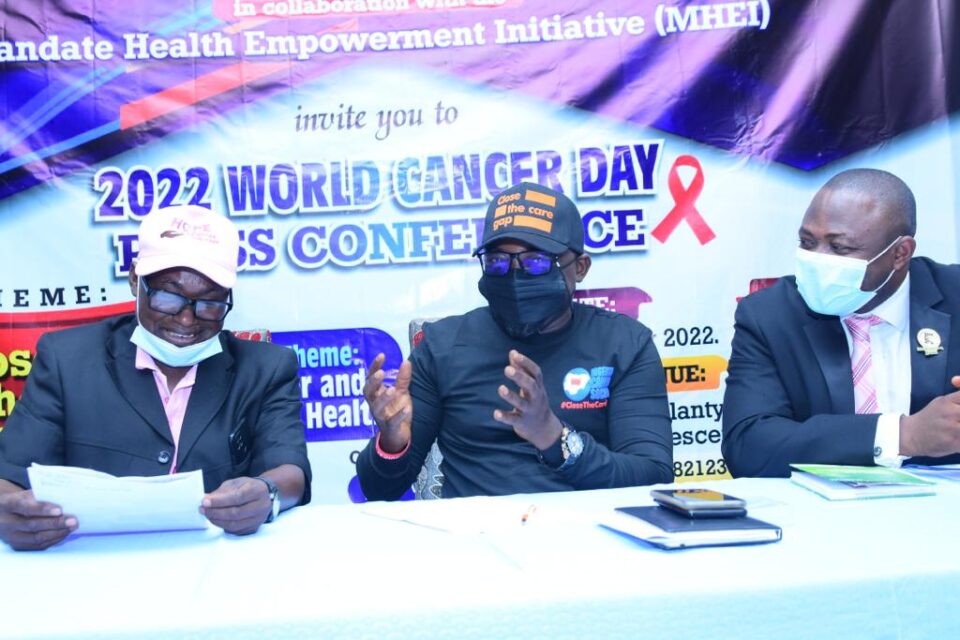…HPV vaccine key to reducing cancer-Expert
By Hassan Zaggi
Nigeria with an estimated population of over 200 million people has only 10 cancer treatment machines. This, therefore, implies that over 20 million Nigerians have only one cancer treatment machine to fall back on when the need arises.
Speaking at a media briefing to mark the 2022 World Cancer Day in Abuja, Friday, the President, Nigeria Cancer Society (NCS), Dr. Adamu Alhassan Uman, regretted that the lack of enough cancer machines (radiotheraphy) has caused a huge gap in accessing cancer treatment in Nigeria.
The media briefing which was organised by the Nigerian Cancer Society (NCS) and Mental Health Empowerment Initiative (MHEI) was supported by the Africa Health Budget Network (AHBN), a Non Governmental Organisation (NGO) which focuses on accountability and transparency in the health sector.
Dr. Umar lamented that: “Nigeria according to the World Health Organisation (WHO) should have at least 300 cancer treatment machines (radiotherapy machines), as opposed to the less than 10 of such machines that are currently operational in the country thereby creating a big gap in cancer care to the teaming populace.
“The gap is further widened when we take into the poovery level (above 40%), the percentage of rural dwellers (above 49%) coupled with the lack of comprehensive health coverage through the National Health Insurance Scheme (NHIS) and inadequate budgetary provision for health (5% of consolidated budget as oppose to the agreed 15% by AU countries).”
He further insisted that access to Human Papiloma Virus (HPV) vaccine will reduce to the barest minimum the incidences of the cancer in Nigeria.
Cervical cancer, he said, can be reduced by 90 per cent if young girls have access to HPV vaccine.
According to him: “It is a clear fact that the lack of access to HPV vaccine, for example, has become a stumbling block towards the elimination of Cervical Cancer in Nigeria.
“The chances of surviving Cervical cancer can be above 90% if young girls are vaccinated against the Human papilloma virus and screening done regularly and the cancer is detected in the early stages.
“However, women living in rural areas face long distances to travel to a care centre that provides screening and must often take time off work or find support for childcare in order to do so.
“This means that she only presents when the cancer has advanced enough and becomes difficult to treat. The politics behind the supply chain for HPV vaccine is another hurdle we face in our country.”
The NCS President, therefore, called on the federal government to “ensure equitable distribution of health infrastructure, especially, at the primary health care level to intensify preventive and regular screening services; ensure timely national roll out of the HPV Vaccination campaign towards elimination of one of the 3 commonest cancers that is 99% preventable in line with the WHO mandate of elimination of cervical cancer.”
He also called on the government to ensure prompt implementation and sustainability of the Cancer Health Fund that covers the 3 commonest cancers including Breast, Cervical and Prostate; increase budgetary allocation to the health sector in line with the 2001 Abuja declaration of allocating at least 15% of annual budget to the health sector and implement policies that will reduce harmful practices such as tobacco smoking and proper attention to non-communicable diseases prevention and treatment.
“Genuine and purposeful attention to the mental health component of healthcare as cancer does not just affect your body, it can also affect the mind causing emotional disturbances such as depression not only to those affected by cancer but to their families and the society at large’ government at all levels to provide suitable conditions for the private sector to be involved in the business of health and a clarion call for philanthropists to invest in the health sector particularly Cancer to ease the sufferings of Nigerians,” Dr. Umar stressed.
Speaking, a renowned pathologist at the University of Abuja Teaching Hospital, Dr. Bawa Ahmed Abimiku, called on Nigerians to ensure they imbibe on practices that will keep them far from cancer.
He charged Nigerians to ensure they do regular exercise- a minimum of 30 minutes daily, always check their weight, avoid smoking and avail themselves to screening at intervals.
“Avoid smoking. This is because smoking affects everywhere it passes through. From the mouth, up to the bladder and up to where it is being secreted.
“If you check all organ cancers, smoke is always being mentioned. When we talk of smoke we mean both active and passive smokers. Active smokers are those that smoke while passive are, for example, those that close themselves in the night club and are just smoking while others are busy inhaling. In fact, the active ones even breath their own out, but the passive ones are just inhaling.”
On his part, the President Mandate Health Empowerment Initiative (MHEI), Ameh Zion Abba, disclosed that an estimated over 70 million Nigerians have mental issues.
He, therefore, called for the quick passage of the mental health bill which is before the National Assembly.
He explained that cancer diagnosis can affect the emotional health of patients, families, and caregivers.
“Common feelings during this life-changing experience include anxiety, distress, and depression. Roles at home, school, and work can be affected. It’s important to recognize these changes and get help when needed.
“Poor mental health is the largest single source of disability, and co-morbid health problems, particularly with cancer, raise total health care costs significantly.
“Unfortunately crosstalk between the disciplines of mental health and oncology is rare in Nigeria, and the psychosocial and mental health problems of patients with cancer are not often well recognized,” he stressed.
Ameh disclosed that an estimated one-third of people treated for cancer in hospitals have a common mental health condition.
“Rates of major depressive disorder are thought to be up to three times higher than in the general population.
“Anywhere from 8-24% of people with cancer are also living with depression.
“Youth and young adults are at greater risk for depression and other conditions compared to adults with cancer,” he reiterated.
Earlier, in his address of welcome, the Coordinator, AHBN, Dr. Aminu Garba Magashi, applauded the cancer stakeholders for organizing the media briefing to commemorate the World Cancer Day. Dr. Magashi who was represented by AHBN’ Senior Programme and Partnership Officer, Dr Obinna Onuoha, said: “We look forward to fruitful deliberations to discuss how we can improve cancer care and close the care gap as the theme for this year’s celebration says, and also to link cancer care with mental health, and underscore the importance of improving mental care services as a significant strategy to alleviating the care gap in cancer.”



